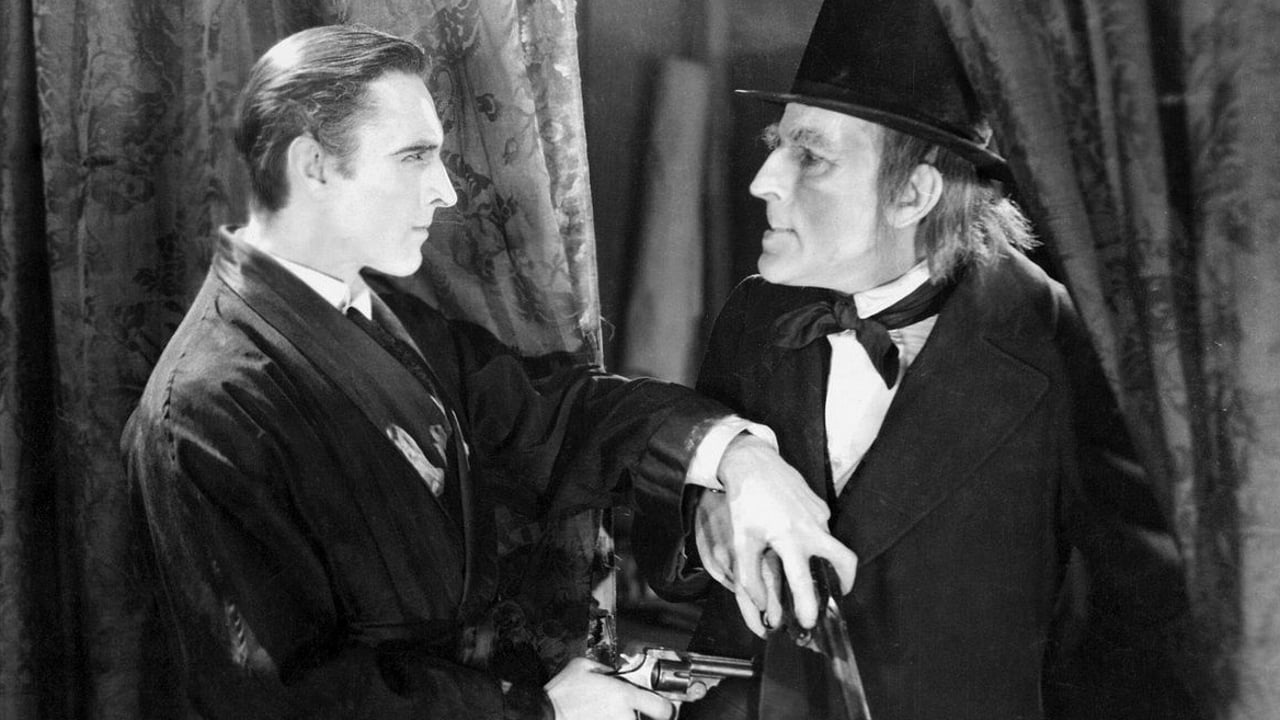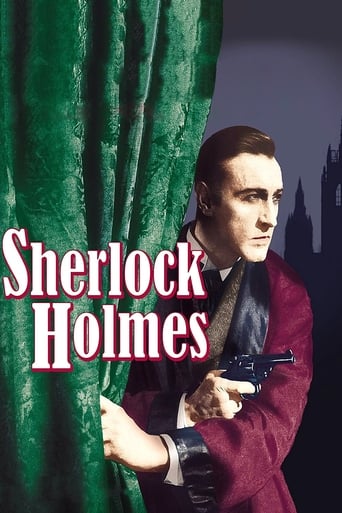

The greatest movie ever!
... View MoreEasily the biggest piece of Right wing non sense propaganda I ever saw.
... View MoreThere are moments that feel comical, some horrific, and some downright inspiring but the tonal shifts hardly matter as the end results come to a film that's perfect for this time.
... View MoreStory: It's very simple but honestly that is fine.
... View MoreAm a huge fan of Sherlock Holmes and get a lot of enjoyment out of Arthur Conan Doyle's stories. Also love Basil Rathbone's and especially Jeremy Brett's interpretations to death. So would naturally see any Sherlock Holmes adaptation that comes my way, regardless of its reception.Moreover, interest in seeing early films based on Conan Doyle's Sherlock Holmes stories and wanting to see as many adaptations of any Sherlock Holmes stories as possible sparked my interest in seeing 'Sherlock Holmes'. Plus to see how John Barrymore would fare as the iconic detective, and see Roland Young and William Powell in their film debuts. After years of being lost and then found and restored, 'Sherlock Holmes' could and should have been great. While not the worst Sherlock Holmes adaptation, 'The Hound of the Baskervilles with Peter Cook and Dudley Moore will always take that dishonour, it is one of the lesser efforts and a contender for the most disappointing. Not awful, but should have been much better.There are strengths. It does look good, with very handsome and evocative set/production design and a lot of strikingly beautiful moments in the photography. Gustav von Seyffertitz is a formidable Moriaty, if occasionally a little eccentric, and William Powell makes a likeable film debut. However, John Barrymore does not look interested or comfortable as Holmes, which is enough to bring the film by more than one star. Furthermore, Roland Young is one of the duller cinematic, and perhaps ever, Watsons and Carol Dempster is a completely vapid leading lady. Nothing intrigues or entertains in the iconic Holmes/Watson chemistry.Despite an interesting idea and an atmospheric start, the story is far too ridiculous (often beyond belief) and tediously paced, with nowhere near enough of Holmes or his deductions. What would have solved that would have been to have less reliance on the too talky, bogging-down-pace and overused talking cards and getting rid of the out of character and out of place, not to mention incredibly bland, love interest relationship. How it's solved is too quick and too easy. In summary, disappointing. 4/10 Bethany Cox
... View MoreSherlock Holmes (1922) ** (out of 4) Considered lost for nearly fifty-years, this film was finally found in the mid-70's but sadly it turns out to be a pretty dull affair. What had silent film buffs so interested in this film was the incredibly cast of actors including John Barrymore as Holmes and Roland Young as Watson. The supporting cast was equally impressive as we see a young William Warren, Reginald Denny and D.W. Griffith's lover, Carol Dempster, in her only screen appearance not directed by Griffith. In the film, Holmes and Watson are friends at Cambridge when Holmes is accused of stealing some money. On the other side of town, the evil Professor Moriarty (Gustav von Seyffertitz) is planning world domination. After Holmes is cleared of the theft he becomes interested in the detective game and sets out to bring Moriarty down. The actual case of Holmes and Moriarty doesn't start until around the fifty minute mark as the first part of the film lets us get introduced to both sides. This here was certainly a mistake as I'm sure people going into this film will know who Holmes is. Another problem is that the film relies way too much on the intertitles and we spend way too much time reading instead of seeing anything happen. Barrymore plays Holmes very straight and I personally find the actor boring when he doesn't go over the top. He really doesn't bring anything to his role but Young is good as Watson. Carol Dempster, on the other hand, doesn't come off too good but she's not horrible either. I'll have to check some of my Griffith books but I'm not quite sure how she got the part in this since most major studios didn't want Griffith using her for anything. There's a nice twist at the end of the movie but by then you'll either be asleep or pushing the FF button.
... View MoreFor decades the 1922 version of Sherlock Holmes starring John Barrymore was thought to be lost, surviving only in the form of a few tantalizing production stills, until an incomplete print finally resurfaced in 1970. Even so, it wasn't until recently that a viewable version was painstakingly pieced together at the George Eastman House in Rochester NY, and it is this restoration which is now available for public screenings, and on DVD. Bearing all this in mind, it's dismaying to report that the film, seen at long last, is a decided disappointment. Unfortunately, this is one of those cases where a rediscovered work falls short of the imagined movie we project in our minds. Film buffs and viewers with a special interest in the Barrymores will want to see it anyway, but dedicated fans of the original Holmes stories, in particular, will likely find it unsatisfying.All the elements were in place for something special when the movie went into production. John Barrymore, in the year of his legendary stage Hamlet, was in his prime; the supporting cast was full of first-rate actors, two of whom (Roland Young and William Powell) made their film debuts here; a number of scenes were filmed on location in London -- an unusual practice at the time -- and the constructed sets were strikingly designed and well photographed. But the first and perhaps biggest problem was the screenplay, which feels off-kilter and oddly lopsided. The early scenes are focused on the activities of the arch-criminal Professor Moriarty, played by that magnificently named character actor, Gustav Von Seyffertitz. We're given a lot of information about this villain's curiously unmotivated evil, but very little information about our hero and his eccentricities. We're forced to conclude either that the screenwriters thought we already knew enough about Sherlock Holmes, or that they considered their bad guy more interesting than their hero.Holmes and Watson are introduced in the prologue as two rather middle-aged looking Cambridge students, and the story seems to concern a scandalous situation on campus involving some of their classmates. Eventually we realize that this is a set-up for the climactic confrontation with Moriarty, years later, although the Professor's connection with the Cambridge scandal is vague and indirect. It takes too long for the viewer to identify the central plot line, too long for Holmes and Watson to set up shop on Baker Street, and too long for Holmes himself to emerge as an adult and take charge of events. Holmes' uncharacteristic romantic interludes with the vapid leading lady -- more about her in a moment -- don't help matters, either.Another major flaw is the over-reliance on title cards. The best silent movies told their tales with minimal titling, or concentrated the bulk of the expository titles in the first reel or two, but this film tells far too much of its story in words which must be read. Reading is all well and good when we curl up at home with a book, but a movie must MOVE. The source material for this film is a stage drama of the 1890s, crafted by the stage's first and most famous Sherlock, actor/playwright William Gillette. The play was not based on any single Conan Doyle story, but borrowed plot elements from several of them -- and, incidentally, it provided a very early stage role for the preteen Charlie Chaplin, who portrayed Billy the messenger boy. Gillette's play certainly had movie potential, but the filmmakers in charge of this adaptation lacked the skill to properly translate the material from stage to screen, and failed to maintain a consistent tone. Is it meant to be serious? Is it a send-up? Hard to say.John Barrymore certainly looks the part, but except for one brief sequence when Holmes disguises himself he doesn't appear to be having much fun. He suggests a male model glumly dressed as Sherlock Holmes in order to pose for a magazine illustrator. He is given several gauzy close-ups emphasizing that famous profile, but seems to be merely posing for stills. Perhaps he wasn't having much fun off camera, either, for according to a recent biography Barrymore loathed his co-star, Carol Dempster. Miss Dempster, not unfairly, is best remembered as the modestly talented girlfriend of director D. W. Griffith, who mysteriously featured her in movie after movie in the 1920s. Not so mysteriously, these movies flopped at the box office and accelerated Griffith's career decline. Sherlock Holmes marked the only occasion Dempster appeared as a leading lady in a non-Griffith production, but why this occurred is anyone's guess. Her role isn't large, and she doesn't have much impact one way or the other, but let's just say she doesn't bring much to the picnic.It's interesting to see William Powell, long before the Thin Man series, looking so young and gawky; unlike his co-stars, he could pass for an undergrad in the opening sequence. But unfortunately, Powell's later scenes are difficult to assess, for despite the best efforts of the Eastman film preservationists the latter portions of the movie are badly tattered, with crucial chunks obviously missing, and this has a serious impact on climactic scenes involving Powell. The climax is difficult to follow because of the poor condition of the surviving print, and although this can't be blamed on the filmmakers it only deepens our sense of disappointment. Still, even in the unlikely event that a better print is discovered, it appears that the people who made this movie just didn't have an affinity for the material. Too bad John Barrymore didn't take another crack at the role in the early '30s, with sound and a better script. But in any case, fans of the Jeremy Brett TV series (and I count myself among them) have a definitive Sherlock to enjoy, thanks to a star and a creative team who knew precisely what they were doing.
... View MoreI recently had the privilege of seeing the "World Premiere" of Albert Parker's version of Sherlock Holmes at The George Eastman House's Dryden Theater. John Barrymore was the sleuth and he was simply grand. I loved every campy moment! I'm quoting now from the capsule description written by the staff at the GEH: Until its rediscovery in the mid-1970s by Eastman House's first film curator James Card, Sherlock Holmes was the most sought-after `lost' John Barrymore film. When another print containing the missing original intertitles was located within the Eastman House's vaults a few years ago, a major restoration was undertaken. The resulting film reveals a faithful adaptation of Sir Arthur Conan Doyle's original story (the film was in fact fully endorsed by Doyle in 1922), as Barrymore's Holmes, aided by the ubiquitous Dr. Watson, battles wits with-who else?-sinister arch-nemesis Professor Moriarty. Live piano by Philip Carli.
... View More